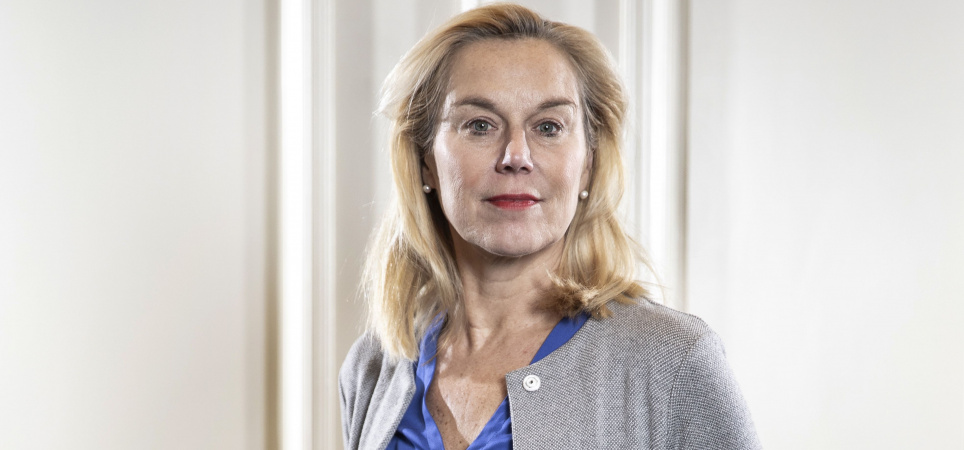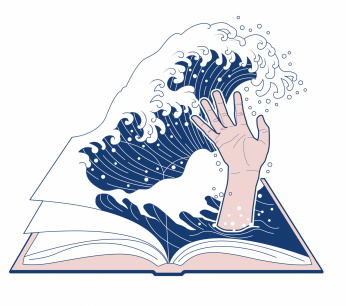Sigrid Kaag: 'Nobody comes into their own in classes that are too large'
Growing up in a family of teachers, D66 party leader Sigrid Kaag got a love for education. After four years of government, she wants to change that education as an expenditure item 'once and for all'.

photo: Fred van Diem
The Education magazine speaks with various party leaders in the run-up to the elections. The February issue contains an interview with Sigrid Kaag from D66.
“I sometimes regret not entering the education myself,” she says at the end of that conversation. The outgoing Minister of Development Affairs likes to explain. According to her, this is due to her origin. Kaag's father was a classical pianist and taught at the PABO. Her mother was a 'teacher'. “My children sometimes get a bit crazy about this need to explain,” she says. “Then they ask a question and want a simple Google answer. But I also try to provide the background. Sharing knowledge is so important to me. "
Feeling
Kaag studied Arabic language and philology in Utrecht. She received her bachelor's degree in Middle Eastern Studies from the American University in Cairo. Then she studied in Oxford, Exeter and at the French École nationale d'administration. Kaag has an impressive career as a diplomat at the United Nations, as a result of which she has lived alternately in New York, Geneva, Sudan, Syria and Jerusalem. Her four children went to school there. “My youngest also in the Netherlands”, she hastens to say when the subject comes up. Critics accuse her of having too little feeling for the Netherlands. "And all my children took higher education here."
School is the place to build a little community again
People with a lot of international experience often say that Dutch education is far from bad. How do you experience that?
“Drawing comparisons between the Netherlands and the other countries where I have worked is unfair. The Netherlands is an OECD country, an EU country. I have experience with education under a tree, where children in groups could receive lessons from a UNICEF suitcase. I have visited schools that were destroyed, where everyone was traumatized by war. In that situation, there is only one thing that everyone - students, teachers, parents - wants: to go back to school. That's the place to build a little community again. School provides a lot of support in crisis situations. When I look at my own childhood - both my parents were sick in my adolescence, I lived in a foster home - school was what kept my sister and me focused, literally and figuratively. Routine is extremely important when everything else around you is uncertain.”
Displeased
In the parliamentary elections four years ago, D66 was the most popular party among AObmembers. Two years later, social liberals dropped to third place. Disappointment about the party spilled over AObelection poll in 2018.
Now it says in the D66 election program: 'We have invested heavily in education.' Many people in education experience this differently.
“You sometimes forget a little in all the turmoil, not everyone is satisfied, but the results are just there: we have invested more than 2 billion in education. We have (in four years' time, ed.) Realized a 10 percent salary increase for primary school teachers, which does not mean that the salary gap with secondary education is over, but it is a good start. We have invested 430 million in workload reduction. I understand that teachers say: Yes, incidental money, thank you the cuckoo, we want structural money. But keep in mind: all these investments would not have come about without D66. ”
I think it is very dignified that education has ceased
Would that money have come without the education strikes?
Stumbling over her words: “I'm looking for the right sentence. I find it very moving and very worthy of the way education has stopped. It was more than a cry from the heart, they went on strike for all of us, for our children, our grandchildren, the girl next door and the boy next door. ”
Your election program also states: 'That is why we are really tackling the teacher shortage now.' That reads a bit like: because we have not done that before.
“The teacher shortage is, of course, one of the dire, structural problems in the Netherlands. People don't choose education to get rich. But you must be rewarded correctly, there must be less work pressure, more room for professional development, smaller class sizes. ”
No one comes into their own if the classes are too large
You often mention this smaller class. The AOb wants classes of no more than 21 students. Do you support that proposal?
“It seems very sensible to me. We say a maximum of 23, but I think we are in the same margin: with such a class size you can get the most out of your students as a teacher. Nobody comes into their own when the classes are too large. ”
Ambitious
D66 is very ambitious in its election program. A selection of the other plans: the rich school day, which will be extended with a program of sports, music and theater. Fixed budgets for research. More broad perennial bridge classes and 10 to 14 schools. And the money should no longer go to the school boards, but directly to the schools.
You can call the latter a system change. Something that educators are rather hesitant about.
“The idea is not that we impose a plan in The Hague that turns out to be impracticable. If the schools and teachers themselves say 'Save us this', then no one from D66 will say 'It was invented by us, so it is a good idea'. Nor is it the intention at all to burden people by saying 'Here's a bag of money, save it'. But we want to give space to sensible people. To the teachers who themselves know what a school needs. Not everything is always complex, sometimes it is about reducing workload, hiring extra staff, sometimes improving safety at school. Schools can also cooperate with each other: one has a good ICT expert, the other has better housing and administration. Moreover: we do not take away the supervisory function of a school board. ”
We should no longer view learning as a kind of pure efficiency matter
Even if these plans were to end up in a coalition agreement, we know that education is rarely allocated the euros that are promised. So what are these plans worth?
“In any case, you know that the other parties already attach much less value to education in election programs. Education is an important discussion for us at the formation table. D66 really wants to make an effort to change once and for all that education is seen as an expenditure item. I think it is very important that we stop discussing learning and see it as a kind of pure profitability issue. It is not, but you can calculate and demonstrate the socio-economic return of education. So I think we should bring the case much better ourselves. ”
Political will for smaller class was never enough
There are several studies that show that investing in education pays off. An investment of 1,5 billion euros in smaller classes, among other things, yields 3,5 billion in extra economic growth, for example one recent study by SEO Economic Research commissioned by the AOb. Kaag: "Research has long been known in many areas, but the political will has never been enough."
Discrimination
You have not only received the beautiful side of education from home.
“My father taught at the teacher training college and became seriously overworked during a period when the education system had to be completely overhauled. As an old-fashioned teacher - and I mean that in the good sense of the word - he was so dear to his heart that he could not practice his profession as he thought necessary. The autonomy of the teacher, but also the reduction of workload, is so important.”
Teacher autonomy is so important
The importance of this autonomy is emphasized in the D66 election program. 'Teachers are given the space to be teachers again', it says. The program includes more themes that touch on Kaag's personal life.
“One of my children did not manage to get a very normal summer job. I didn't understand at all. My husband (with Arabic surname, ed.) Said to our son, "Try your mother's last name." I still replied 'Well no, it won't be that bad.' But yes, with my name my son could get started right away. Of course I knew the studies, now I also have the experience. It gave me a glimpse into what life can be like when you continuously run into a barrier. That is why D66 wants to tackle internship discrimination with a hotline. From now on, MBO institutions, not the students themselves, have to arrange the internships. "
Elitist
What else have you learned about education from your parents?
“An enormous love and respect for the profession. A basic understanding of how important it is. My parents had a good education and they tried to pass that on to us. ”
Kaag posted one in December post on Instagram in which she writes that in the 66s she found it 'difficult' to choose between the universities of Oxford, Cambridge and Exeter. Critics saw this as a confirmation that the DXNUMX party leader would be elitist.
“That may not have been such a useful post. What I wanted to say: We weren't rich at all at home. Still, I was able to study in Oxford on my own, with a scholarship. That is the power of education, you can transcend anything. ”
If something forms a barrier, you as a party must dare to come to a closer understanding
Which brings us to the loan system. D66 was in favor, but now comes with an alternative to the loan system, with a kind of basic grant to replace the care and housing allowance and a 'supplementary' grant, the amount of which depends on the income of the parents.
“We are an economically oriented country. I think many young people whose parents are unable to help them financially have become discouraged by the loan system. We underestimated that. While the idea of education is emancipatory. If something forms a barrier, as a party you have to dare to come to further insight. ”
This article is part of a series of interviews with party leaders in the Education Magazine. It appeared in the February issue. The January issue contained an interview with GroenLinks foreman Jesse Klaver.
AObmembers receive the Education Magazine eleven times a year in the mail.


